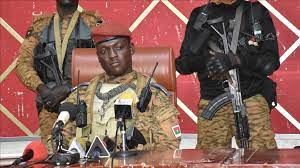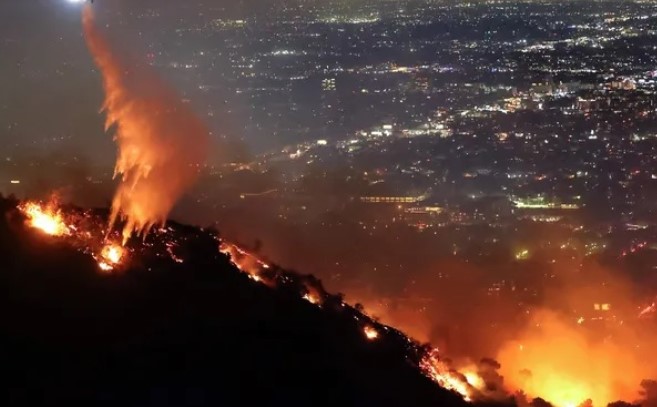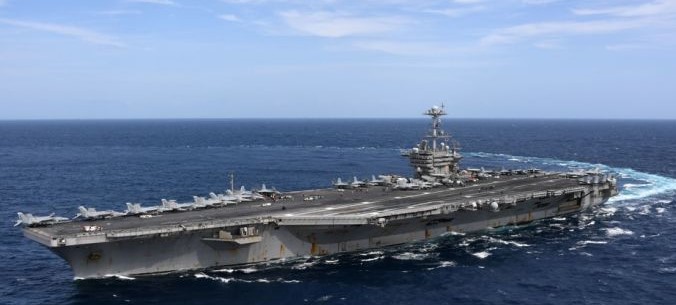
Burkina Faso coup. Foto has taken from Anadolu Agency
STRATEGIC ASSESSMENT. On October 1, 2022, yet another military coup took place in Burkina Faso, just nine months after the country’s previous military coup in January 2022, signaling deteriorating security and stability in the Sahel. In response, France advised against all travel to Burkina Faso not only because of the increasing jihadist incursions deep into the country but also due to potential anti-France hostilities. Indeed, as the coup was unfolding, pro-coup demonstrators stormed the French embassy gates in Ouagadougou, and while they failed to enter it, they did set its perimeter on fire. The coup leader, Captain Ibrahim Traore, benefitted from stoking anti-French sentiment to gain support for ousting Paul-Henri Sandaogo Damiba from power. Damiba himself seized power through his own coup in January. As part of his claim to legitimacy, he promised his Patriotic Movement for Safeguarding and Restoration would stem the tide of the al-Qaeda- and ISIS-affiliated insurgencies in Burkina Faso and restore civilian rule. After nine months in power, the insurgencies have only grown stronger, as Damiba did little to restore civilian authority in the country.
To justify the coup earlier this year, Damiba argued that military rule was needed to combat the jihadists. Despite his failure to achieve this aim, Traore is now ironically making the same claim to justify his own rule. Traore further claimed that Damiba was backed by France, which was followed by unsubstantiated rumors that Damiba had retreated into a French base in Ouagadougou. While the jihadist insurgency in Burkina Faso that spread initially from Mali ten years ago can hardly be blamed on France, Traore’s supporters tend to link France with being responsible for the insurgency. It remains unclear whether supporters truly believe this, or, rather, it serves as a convenient pretext to bring in new strategic partners like Russia. The coup leaders have sought the backing of Russia, apparent from the Russian flags and other Russian paraphernalia seen on the streets of Ouagadougou as Traoré wrested power from Damiba. “I know that France cannot interfere directly in our affairs,” Captain Traoré reportedly said, adding: “The Americans are our partners now, [but] we can also have Russia as a partner.” While the Russian military undoubtedly has its hands full in Ukraine, given past involvement by the Russian private military contractor Wagner Group, it would not be surprising to see Moscow engaging more closely with Traore and his inner circle. Still, Burkina Faso is not Mali, and while the Russians may very well be behind stoking anti-French sentiment, it is not inevitable that Wagner will end up on the ground in Burkina Faso.
Traoré accepted Damiba’s “seven conditions” for stepping down on October 1, which he claimed was to avoid any further bloodshed. These vague conditions related to “continuing operations” against the jihadists, “national reconciliation,” assurances that new leaders would respect the pledge to return to civilian rule, and guaranteeing Damiba’s own security. While the worst-case scenario of a civil war was avoided, there is little reason to think there will be long-term benefits from the latest coup. Burkina Faso has now experienced two coups in a nine-month period, which occurs alongside two coups in Mali in 2020 and 2021, a coup in Guinea in 2021, an attempted coup in Benin in 2020, and an attempt by rebels to overthrow Chad’s government earlier this year after longtime Chadian leader, Idriss Deby, was killed during a rebel attack. In 2021 UN Secretary-General Antonio Guterres expressed concern about the “epidemic of coup d’états” and called on Security Council members to come together and ensure “effective deterrence,” a prospect which appears increasingly unlikely as relationships among the permanent members in particular has grown fractious in the wake of Russia’s invasion of Ukraine.
West Africa is on the backfoot when it comes to democratic transition, while military rule has done little to curb the region’s jihadist insurgencies. Indeed, the Burkinabe military rulers’ promises to combat the jihadist threat with greater priority, if not also with Russian Wagner Group support, will have limited impact in the absence of a broader whole-of-society approach involving meaningful political reforms. While France’s colonial record – like that of other powers in the region – can be criticized, blaming France for the current jihadist advances, which led to France withdrawing from Mali under the junta’s pressure, will not be beneficial and reports suggest that the Wagner Group will be more brutal and less operationally effective than French counterterrorism forces, should Burkina Faso’s military leadership solicit Wagner assistance. France has served as somewhat of a “bogeyman,” or an excuse to account for the growing strength of jihadists in Burkina Faso and the Sahel more broadly.
Despite the ambitious statements of the new leaders in Ouagadougou, the jihadists seem undaunted as they continue to steamroll through large swaths of Burkina Faso and Mali and into littoral West African states like Togo and Benin. Al-Qaeda and ISIS affiliates will only benefit from all the internal military and political squabbles enveloping Burkina Faso and other countries in the region. From a broader perspective, it appears that different factions of Burkina Faso’s military are increasingly busy contesting each other and blaming the other side (as well as France) for the military’s failure to stop the jihadists. This distracts attention not only from the priority of regaining state control over its territory but also from addressing critical governance and development challenges. The immediate result of the recent coup is a more fractured military and a more isolated Burkina Faso, both troubling developments for a region already on edge. For a country that ranked 184 out of 191 on the Human Development Index in 2021, such infighting could further exacerbate the very conditions that armed groups and jihadist actors have sought to exploit across the region.





